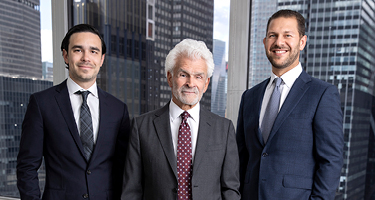Starting Two Businesses, Responsively
In 1999, I was a commercial litigator at a Philadelphia law firm and a mother of two, working reduced hours on a delayed partnership track. Despite the support from colleagues, I felt isolated and challenged by the prospect of thriving as a lawyer and playing an integral role in my kids’ lives. When I spoke to other lawyer moms about these issues, they were equally dismayed. I occasionally had lunch with three colleagues, and I found it helpful to talk about our strategies, successes, and frustrations. I decided to do more with these occasional lunches, and I shared the idea with a colleague who encouraged me to do so.
I sent an email invite to six women lawyers who were working reduced hours at Philadelphia law firms. The email announced that I was starting a brown-bag lunch group for lawyers interested in work-life balance issues. I encouraged recipients to forward the invitation to anyone they thought might be interested. Within days, 150 lawyers emailed me back. Excited by the response, I felt I had struck a nerve. After running that first brown-bag lunch event in July 1999, I knew that this innocuous support group could be much more.
According to Merriam-Webster, “responsive” means “reacting in a desired or positive way” or being “quick to react or respond,” while “initiative” is “the power or opportunity to do something before others do.”
Soon to be named Flex-Time Lawyers, LLC, the organization became a network for lawyers to derive support and career guidance as well as find networking opportunities and a means for change. In January 2000, National Public Radio featured a Flex-Time Lawyers event and the response was viral. Within months, my inbox was inundated with “Dear Debbie” emails from lawyers around the country. Over the next decade, I stopped practicing law, created a New York chapter of Flex-Time Lawyers, started consulting and speaking on work-life and women’s issues, developed a national network of over 10,000 lawyers, and authored my first book.
In 2008, I reconnected with Garry Berger, who had worked with me as a summer associate 15 years prior at a large law firm in New York. Garry got in touch because he ran a virtual law firm and had learned of my Flex-Time Lawyers network. He relayed that his roster of corporate clients kept asking to borrow his firm’s lawyers, and he no longer had enough lawyers to lend. So, Garry and one of his colleagues, Suzie Scanlon Rabinowitz, asked me to help fill their “secondments,” where together we would lend out high-caliber lawyers from the Flex-Time Lawyers network on temporary engagements to clients through their virtual law firm. Thus was born Bliss Lawyers, an accessible bench of top lawyers ready to work for Fortune 500 companies in a full range of industry sectors in states across the country.
Responsive Initiative Defined
The evolutions of Flex-Time Lawyers and Bliss Lawyers have many commonalities. Neither involved an initial business plan or even a clear vision for a new company. Flex-Time Lawyers began as a small grassroots movement of stigmatized working moms at a time, 1999, when no one was talking about work-life issues. Bliss Lawyers began so Garry wouldn’t have to disappoint his corporate clients who needed flexible staffing help and a way to circumvent full-time headcount constraints.
While there was little premeditation in either of these businesses, they both relied on a strong responsive component. Once it was clear that there was a compelling unfulfilled interest in work-life issues in the legal profession, I knew to respond to those needs even if I didn’t quite know how. And, when it became evident that Garry’s clients had a need for lawyers to work differently to meet their legal needs, we knew to address the client needs even if we had not worked out the particulars of how best to do so.
“Responsive Initiative” is a concept I think needs coining as an oxymoron and a fresh twist on innovation. According to Merriam-Webster, “responsive” means “reacting in a desired or positive way” or being “quick to react or respond,” while “initiative” is “the power or opportunity to do something before others do.” Thus, combining these two concepts, Responsive Initiative is the ability to create something new by reacting faster and more effectively than anyone else in the marketplace to a force or thing that already exists and presents itself. This is contrary to the notion that something new must be original. Instead, Responsive Initiative teaches us that something new can merely be a different reaction to an existing gap that needs to be fulfilled.
The contrast in the terms “Responsive” and “Initiative” should be heartening to an intimidated entrepreneur, a reluctant leader, or a hesitant job seeker. So often, people stagnate because they are waiting for “the big idea,” or they are worried about making a fatal mistake and they don’t want to make a decision until they feel 100 percent secure in it. This is regularly the case with individuals who want to start a business, lead an organization, find a job, or pursue countless other beginnings. Being paralyzed by seeking out the perfect solution, idea or path is quite common, and it can be crippling.
Responsive Initiative asks you to do something different. It asks that you pay attention to your surroundings, rather than discover them. It asks you to notice what people are seeking you out for and then figure out how to address the needs presented to you. And, if it is not readily apparent what need in the market you are meant to fill, it gives you the tools to find it.
Of course, Responsive Initiative is not meant to replace other types of discovery. There is still plenty of room for different ways that businesses, ideas, and careers originate and develop. Yet Responsive Initiative is a way for those who are otherwise missing or skirting an opportunity for fear that it’s too intimidating to seize upon it. That said, Responsive Initiative is not magical. I don’t want to oversimplify and suggest that you simply put your toe in the water and if a ripple results, you have a new business or a new way to lead or pursue a career. There are many steps in between.
The Importance of Homework
Research is key in determining if you have identified a gap in the market that is viable and needs to be filled. The research to make such determinations may take many forms. For Flex-Time Lawyers, once I realized there was a need for a network of lawyers seeking a resource on work-life issues, I had to determine if that need was already being met. While I knew that competition often demonstrates a market need, I also didn’t want to duplicate efforts. I remember someone relaying that the Philadelphia Bar Association had a “Lawyers at Home” Committee, so perhaps it was not necessary to start another organization with overlapping needs. However, “Lawyers at Home” was addressing a very different community: lawyers who had left the law. I knew it was precisely this difference, between lawyers who had left and lawyers who were trying to practice in an alternative way, which was driving the energy around Flex-Time Lawyers. My research otherwise involved speaking with the constituents. Every lawyer mother whom I spoke to seemed to be struggling with the same challenge of how to be successful in both realms—the home and the workplace—and no outlet seemed to be addressing this dual aspiration.
For Bliss Lawyers, the research involved speaking with the clients. While promoting my first book, I ran events around the country with high-profile general counsel. Regardless of industry or geography, these general counsel said the same thing: They were getting pressed to reduce their law firm budgets and do more work in their law departments, yet they were not getting authorization to increase their headcount. They were uncertain of their staffing needs, and they sought greater flexibility by accessing highly skilled lawyers in a temporary workforce. Rather than automatically hire outside law firms, these general counsel were beginning to turn to secondment firms to perform some of the work of traditional law firms. These general counsel also expressed a frustration about having to pay for the real estate costs of their outside law firms, knowing that part of these law firms’ high rates was due to their overhead (and the artwork on the walls). Hearing this feedback, Garry, Suzie, and I were affirmed in our purpose, and it propelled our work forward.
The Importance of Piloting
Identifying a market need and interest is one thing, but assessing whether there is a profitable business or a viable business strategy is another. Many business leaders and entrepreneurs make the mistake of launching without testing the concept or product or determining if they are the best source to fill the need in the market. Thus, piloting is essential. It not only ensures the viability of the service, market, product, or path but also assures that you have developed the expertise and resources, and you are the best one in the market to fulfill it.
For me, three years has been the magic timeframe to pilot a business, but the amount of time, of course, will vary depending on the nature of the business or initiative. With Flex-Time Lawyers, I ran events for three years pro bono before ever charging a fee. This brought a lot of value. It enabled me to determine whether the market need was real and assess its dimensions. It helped me discover whether I could charge for my services and how I could best be responsive to the constituent needs. The time also allowed me to develop an expertise and following before billing for services.
Piloting reduces the risk of failing and enables you to harness and hone instincts to ensure a readiness for market. At Bliss Lawyers, for three years, we lent out lawyers to Garry and Suzie’s law firm clients before we formed a separate entity to run our secondment business. We knew we had identified a market need but those three years of piloting allowed us to see if we could be the ones to meet the demand better than others. In part, that came back to research. Competitors had already designed a successful model of lending out high-caliber lawyers to clients for secondments. We liked that model and added to it by building our company on a virtual platform, instead of in a brick–and-mortar office, enabling us to bill our clients less while providing generous compensation and benefits packages to our lawyers. It was our way to ensure we were distinguishable and the best in meeting the
market needs.
The Importance of Failure and Risk
Even with good research and effective piloting, it is difficult to avoid being stymied by fear. There are numerous strategies to help people overcome their fear of failure. Many of these strategies involve contemplating worst case scenarios and determining how to overcome them. Helpful strategies also involve contingency planning, goal setting, and consultation with others. In addition to these approaches, being resilient and willing to persevere and regularly put yourself out there is essential. And, rather than seeing your unsuccessful attempts as failures, see them as lessons and learnings to incorporate into your next effort.
In running Flex-Time Lawyers for 17 years, I can’t count the number of initiatives that have failed. If I really let myself think about, it is embarrassing how many ideas I’ve thrown out to key contacts of mine only to see the momentum of those efforts extinguished. To reference baseball, batting .300 (and failing more than two-thirds of the time) means you are among the best batters in the league; and that is the message. Responsive Initiative is not about perfection. It is about doing your homework, piloting, harnessing, honing, and then launching.
Resulting Growth Opportunities
While facing your fears and taking risks are scary, the benefits may be ones you have never dreamed—which is what makes taking the risk worthwhile in the first place. What Responsive Initiative does is exemplify how one thing leads to another. Great opportunities are ones you will never discover unless you take the first step to try.
At Bliss Lawyers, lending out high-caliber temporary lawyers to our clients led to them asking to convert our lawyers into permanent employees of their companies. Temp-to-perm growth led to full-blown recruiting, where clients asked for access to our talent pool for their permanent hires, not just their temporary needs. Law firms started to wonder if they should mirror their clients’ model and similarly expand and contract their talent pools as needed; thus, the Bliss Lawyers law firm division was launched. These examples of growth and expansion are the organic results of opportunity. It is about not only taking risk, but also being agile and listening and responding to client and constituent needs as they ebb, flow, and grow.
The Value of Hybrid Growth
Although we have focused on the value of creating and responding to opportunities that present themselves in the marketplace, I am also a big fan of hybrid growth, i.e., building and improving upon the innovations of others.
In developing Bliss Lawyers, the goal was to be the first thriving business founded on merging two innovations pioneered by others—the secondment and the virtual firm. The importance of this approach goes beyond our goal of creating a more competitive business model and better choices for our clients and our lawyers. By developing a company that builds and improves upon the teachings of others, we hope to do our share to further market efficiency.
Listening and Acting
As an entrepreneur, leader, job seeker, or individual hoping to make an impact, it is not always clear what path to pursue. The opportunities and various directions that you consider may be daunting. In my own case, a lot of the decision-making was resolved by paying close attention to not only the vagaries of the market but also what others kept on seeking me out to do. This is where Responsive Initiative, again, can be a guide. Being responsive reminds us to listen and pay attention to what is around us. So often, individuals act without proper reflection. Listening is essential. Yet being responsive, alone, is not enough, it must be coupled with action. Initiative gives us the impetus to take action and respond to the challenges we observe. In addition to listening and acting, a dose of humor and humility will go a long way to helping you build both your business and your career.
































